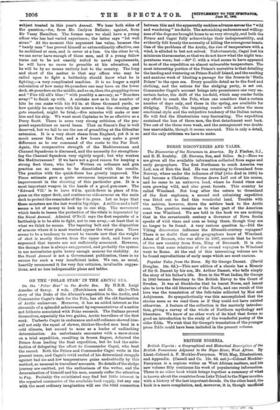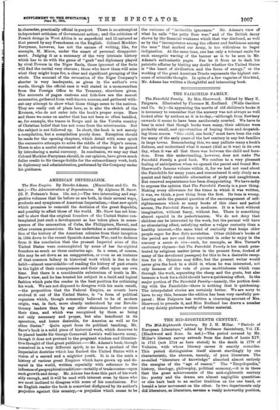BRITISH NIGERIA.
British Nigeria : a Geographical and Historical Description of the British Possessions Adjacent to the Niger River, West Africa. By Lieut.-Colonel A. F. Mockler-Ferryman. With Map, Illustrations, and Appendix. (Cassell and Co. 12s. 6d. net.)—Colonel Mockler- Ferryman is a copious writer on West African matters, and his new volume fitly continues his work of popularising information. There is no other book which brings together a summary of what is known about the countries from Lake Tchad to the Niger months, with a history of the last important decade. On the other hand, the book is a mere compilation, and, moreover, it is, though unofficial in character, practically official in purport. There is no attempt at independent criticism of Government action ; and the criticism of French doings in West Africa is as superficial and ill-natured as that passed by any Frenchman on the English. Colonel Mockler- Ferryman, however, has not the excuse of writing, like, for example, M. Mizon, under the smart of personal disappoint- ment. Judging it as a summary of the very intricate history which has to do with the game of " grab " and diplomacy played by rival Powers in the Niger Basin, those ignorant of the facts will find the recital very obscure ; those who know them will miss what they might hope for, a clear and significant grouping of the whole. The account of the revocation of the Niger Company's charter is very inadequate, as given in the author's own words, though the official case is well stated in a memorandum from the Foreign Office to the Treasury, elsewhere given. The accounts of pagan customs and folk-lore are the merest summaries, gathered from well-known sources, and gathered with- out any attempt to show what these things mean to the natives. They are really out of place here, as is also the sketch of the Krumen, who do not enter into the book's proper scope. Here and there we come on matter that has not been so often handled, as, for example, the traces in Borgu and in the Yoruba country of Christian belief that has not come from the missionaries. But the subject is not followed up. In short, the book is not merely a compilation, but a compilation poorly done. Exception should be made for the opening chapters, which detail with some spirit the successive attempts to solve the riddle of the Niger's course. There is also a useful statement of the advantages to be gained by introducing a metal currency. In conclusion, we may say that Colonel Mockler-Ferryman should, in our opinion, have given much fuller credit to Sir George Goldie for the extraordinary work, both in diplomacy and administration, performed by the Company under his guidance.























































 Previous page
Previous page